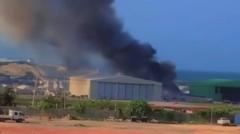From protests to morgues, women like Saira Baloch epitomize the struggle for justice in Balochistan. Thousands are missing, and families demand answers in a region marked by violence and enforced disappearances.
The Unending Search: Women in Balochistan Demand Justice for Disappeared Loved Ones

The Unending Search: Women in Balochistan Demand Justice for Disappeared Loved Ones
In Balochistan, countless women, including Saira Baloch and others, are on a desperate quest for missing family members allegedly taken by Pakistan's security forces.
Saira Baloch’s life changed dramatically at just 15 years old when she first entered a morgue, a place where heartbreak echoed in the muted sobs and whispered prayers of grieving families. She was searching for her brother, a police officer who had vanished after being arrested during a counter-terrorism operation in Pakistan’s volatile Balochistan province. Over seven years have passed since Muhammad Asif Baloch went missing, yet she still faces the haunting hope of finding him among unclaimed bodies.
Saira's experience is all too familiar in Balochistan, where women across generations are compelled to demand justice for thousands of men they assert have been forcibly disappeared by state security forces. These women recall their loved ones—often innocent victims caught in the crossfire of a longstanding separatist insurgency—who have vanished without a trace, leaving families to navigate a harrowing journey of despair.
Recent reports suggest that since 2011, over 2,900 cases of enforced disappearances have been officially recounted, though activists place the figure at around 7,000. Survivors often return traumatized or are found in unmarked graves, their identities obscured by violence. While the government tends to downplay the scale of these disappearances, claiming many were "self-disappearances," families contend that state suppressions of dissent and collective punishment are the real motive behind these alarming trends.
In response to the ongoing crisis, women have taken to the streets in protest. Their power is amplified by their shared grief; with every fading photograph they hold up, they demand answers and accountability. Jannat Bibi, on the fringes of her 70s, speaks fervently about her son, who disappeared in 2012, and her search for justice that led her to Islamabad.
The region of Balochistan, rich in resources yet impoverished, stands as a testament to a story of neglect and oppression. Since its incorporation into Pakistan in 1948, tensions have simmered, fueled by resistance against perceived exploitation of the land. With militant groups intensifying their actions, the cycle of violence continues, and enforced disappearances have proliferated as a grim state strategy to quash dissent.
Despite the odds, women like Mahrang Baloch emerge as vocal leaders in protests, fueled by the pain of losing both her father and brother to the same cycle of violence. Mahrang warns that ignoring these enforced disappearances only fosters more resistance and fear. Her resolve remains unbroken, leading the charge for change even amid threats and intimidation.
The protests attract the attention of young voices as well. Masooma, a ten-year-old girl who lost her father during a raid, joins ranks with grieving families, clutching onto his photo as she chants for justice. Her letters to her father, filled with longing and sorrow, exemplify the tragic lengths families must go through as they await the return of their loved ones.
In this relentless quest for justice, these women embody resilience, refusing to be silenced. As they confront a harsh reality marked by loss and uncertainty, their resolve only grows stronger, seeking not just recognition for their missing, but a future free from fear.





















